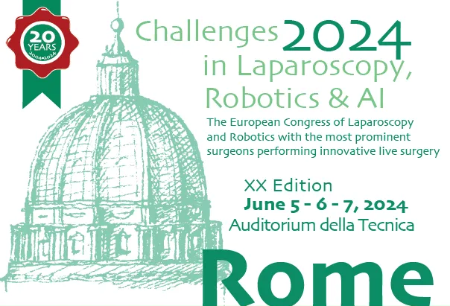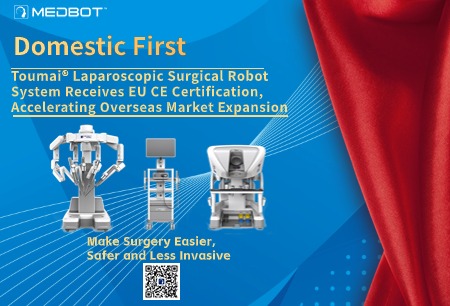【Editor's Note】Recently, Toumai® successfully completed its debut and was put into clinical use at the Gongli Hospital in Pudong New Area, Shanghai. It became the first Chinese-developed four-arm laparoscopic surgical robot to be deployed in a medical institution in Pudong and enter clinical application. It will provide safe, efficient, and precise support for minimally invasive surgeries carried out by multidisciplinary experts in the hospital, leading the way to a new era of more precise, minimally invasive, and safer treatment of injuries in the region. This achievement has received significant coverage from the Xinmin Evening News, Wenhui Daily, and "Pudong Releases".

【Xinmin Evening News】:Chinese-developed minimally invasive surgical robot enters commercial operation, Gongli Hospital creates a medical-industrial integration ecosystem
Recently, in the operating room of Gongli Hospital in Pudong New Area, Shanghai, Professor Wang Zhong, the head of the Department of Urology and Andrology, successfully performed a radical prostatectomy using the first Toumai® four-arm laparoscopic surgical robot (hereinafter referred to as the "Toumai® ") in Pudong. It is reported that this is the first Chinese-developed four-arm laparoscopic surgical robot to be deployed in a medical institution in Pudong and enter clinical application, marking a milestone in enhancing the regional medical level and serving a large number of patients.
As a medical-engineering collaboration partner, Professor Wang Zhong revealed that Gongli Hospital has been working closely with the Toumai® robot engineering team from the early stages of its development, providing many opinions and suggestions based on clinical needs. For example, under the current technical conditions, doctors cannot directly perceive the robot's force and can only rely on experience to judge through images. The engineering team of Toumai®, based on the suggestions of Professor Wang Zhong's team, conducted in-depth research in areas such as motors, mechanics, transmission, algorithms, etc., and finally developed fine force perception technology, which can assist surgeons in performing more precise operations, such as tissue traction, separation, and suturing.
It is understood that the successful deployment of the Toumai® at Gongli Hospital required strict bidding procedures and procurement processes. It required sufficient communication among the Health Commission, the hospital, and the company, and timely preparation and full demonstration before equipment procurement to ensure the smooth purchase of the Toumai®. Wang Peng, the president of Gongli Hospital, said, "We are focusing on building a medical-industrial integration ecosystem and promoting the construction of a science and technology innovation-oriented hospital with the intersection of medicine and engineering as its characteristic."
It is reported that in 2023, Gongli Hospital, relying on the Medical Technology College of a university, will recruit a large number of graduate students majoring in medicine and engineering, becoming one of the medical institutions with the highest concentration of new medical graduate students in China. They have established a Medical-Industrial Integration Office, signed a trilateral cooperation framework agreement among universities, hospitals, and enterprises, hosted the "Pudong New Area Clinical Research and Application Alliance Summit Forum," promoted the establishment of the "Pudong New Area Laser Medicine Innovation Center" shared platform, initiated the "Belt and Road Initiative Medical Device Graduate Education" project, and jointly established the "Pudong In-Vitro Diagnostic Reagent and Equipment Research and Development Center." These "highlight moments" have opened up a new path for the integration of industry, academia, and research, and promoted the cooperation and innovation of medical engineering to enter a new stage of high density and strong linkage. (Reporter: Zuo Yan)
【Wenhui Daily】:Chinese-developed minimally invasive surgical robot settles in Gongli Hospital, doctors are no longer just "users"
Recently, in the operating room of Gongli Hospital in Pudong New Area, Shanghai, Professor Wang Zhong, the head of the Department of Urology and Andrology, successfully performed a radical prostatectomy using the Toumai® four-arm laparoscopic surgical robot. This is the first Chinese-developed four-arm laparoscopic surgical robot to be deployed in a medical institution and enter clinical application in Pudong, which is of great significance in improving the regional medical level and serving a large number of patients.
For this Chinese-developed medical device, doctors are no longer just "users." As a medical-engineering collaboration partner, Professor Wang Zhong revealed that doctors have been working side by side with the engineers of Toumai® since its development stage, providing many opinions and suggestions based on clinical needs. For example, under the current technical conditions, doctors cannot directly perceive the robot's force and can only rely on experience to judge through images. The engineering team of Toumai®, based on the suggestions of Professor Wang Zhong's team, conducted in-depth research in areas such as motors, mechanics, transmission, algorithms, etc., and finally developed fine force perception technology, which can assist surgeons in performing more precise operations, such as tissue traction, separation, and suturing.
The successful deployment of Toumai® at Gongli Hospital required strict bidding procedures and procurement processes. It required sufficient communication among the Health Commission, the hospital, and the company, and timely preparation and full demonstration before equipment procurement to ensure the smooth purchase of the Chinese-developed surgical robot.
Wang Peng, the president of Gongli Hospital, also revealed, "We are focusing on building a medical-industrial integration ecosystem and promoting the construction of a science and technology innovation-oriented hospital with the intersection of medicine and engineering as its characteristic."
In 2023, Gongli Hospital will recruit a large number of graduate students majoring in medicine and engineering relying on the Medical Technology College of a university. They have established a Medical-Industrial Integration Office, signed a trilateral cooperation framework agreement among universities, hospitals, and enterprises, hosted the "Pudong New Area Clinical Research and Application Alliance Summit Forum," promoted the establishment of the "Pudong New Area Laser Medicine Innovation Center" shared platform, initiated the "Belt and Road Initiative Medical Device Graduate Education" project, and jointly established the "Pudong In-Vitro Diagnostic Reagent and Equipment Research and Development Center." These new initiatives are actively promoting the integration of industry, academia, and research and pushing the cooperation and innovation of medical engineering into a new stage of high density and strong linkage. (Reporter: Tang Wenjia)
【Pudong Release】: Acceleration of Commercialization Process for Domestic Laparoscopic Surgical Robots! Toumai® Deployed at Gongli Hospital.
Recently, the first Toumai® four-arm laparoscopic surgical robot in Pudong, Shanghai, officially entered commercial operation at Gongli Hospital. Previously, Toumai® had won its first overseas order for the sale of Chinese-developed laparoscopic surgical robots, marking a new breakthrough in the international market for high-end medical equipment. It is reported that Toumai® deployed at Gongli Hospital is the same model as the one that secured the first overseas order.
According to Shanghai MicroPort AG百家乐 (Group) Co., Ltd. (hereinafter referred to as " AG百家乐® "), since obtaining the first NMPA approval for listing in January 2022 and officially starting commercialization, by the end of 2023, Toumai® has won bids in more than 15 hospitals across the country, ranking first in sales among Chinese-developed brands of laparoscopic surgical robots.
From trial use to official sales, Toumai® has received precise support from two platforms, namely the "Medical-Industrial Integration Innovation Source Platform" and the "Clinical Research and Application Alliance" in Pudong. As a medical-engineering collaboration partner, Professor Wang Zhong, the head of the Department of Urology at Gongli Hospital in Pudong, revealed that Gongli Hospital had been working side by side with the engineers from AG百家乐® since the development stage of Toumai®. "Doctors have extensive surgical experience and many ideas for optimizing surgical robots or technological innovations. The doctor's team and the R&D team brainstormed and selected the best solution from various docking options, ultimately creating a new generation of products."
The relevant person in charge of the Pudong Health Commission stated that after the market launch of innovative medical devices, they must be used in medical institutions to form a virtuous cycle of further research and investment. Therefore, the Health Commission regards the clinical application of innovative medical devices as one of the important tasks of medical-industrial integration, striving to bridge the "last mile of clinical application," establish a priority fast admission mechanism, and encourage medical institutions to use innovative medical devices. It is reported that all 29 drugs and 18 medical devices listed in the first batch of catalogs of innovative medical devices and the recommended catalog of key industrial enterprises in the new area have been put into use in hospitals.
Taking the deployment of Toumai® at Gongli Hospital as an example, the process of commercial installation requires strict bidding procedures and procurement processes. It requires sufficient communication among the Health Commission, the hospital, and the company, and timely preparation and full demonstration before equipment procurement to ensure the smooth purchase of Toumai®.
Gongli Hospital's director, Wang Peng, said, "We are striving to build a medical-industrial integration ecosystem and promote the development of a science and innovation-oriented hospital with a focus on the intersection of medicine and engineering." In 2023, Gongli Hospital, relying on the Medical Technology College of a university, will recruit a large number of graduate students specializing in the intersection of medicine and engineering, becoming one of the medical institutions with the highest concentration of new medical research graduate students in China. In addition, they have signed a tripartite cooperation framework agreement between universities, hospitals, and enterprises, hosted the "Pudong New Area Clinical Research and Application Alliance Summit Forum," promoted the establishment of a shared platform for the "Pudong New Area Laser Medicine Innovation Center," launched the "Belt and Road Initiative" medical device research graduate training program, and jointly established the "Pudong In-vitro Diagnostic Reagent and Equipment R&D Center" ... These are all "highlight moments" that open up a new path of integration between industry, academia, and research.
Pudong New Area continues to promote the acceleration of the entire chain of biomedical innovation, further facilitating the integration of clinical trial resources in medical institutions, innovative source resources in research institutions, and industrial research and development conversion resources at a higher level, broader scope, and deeper extent. They have established a "Four-Medical Linkage" mechanism involving medical research, medical schools, medical enterprises, and medical engineering to promote the coordinated development of healthcare and the biopharmaceutical industry. In terms of medical research collaboration, it has led to an increase in the quantity and effectiveness of clinical trials, with project approval times shortened to less than one month, significantly lower than the industry average. In terms of medical school collaboration, Oriental Hospital has established the "Stem Cell Engineering Translational Medicine Center" relying on Tongji University and the Shanghai Advanced Research Institute of the Chinese Academy of Sciences. Pudong Hospital has collaborated with Fudan University to establish a large animal experimental center and has been approved as the "Fudan University Cell Immunotherapy Clinical Research Center." Additionally, Zhoupu Hospital has collaborated with the Zhangjiang Science City to promote innovation in mixed reality technology and mixed reality (MR) digital holographic imaging technology, serving as a case of medical-engineering collaboration accelerating the transformation of achievements. (Reporter: Zhang Qi)
-
 2024-06-26International Orders of Toumai® Robots EXCEED 10 Units! Domestic Surgical Robots Achieve Major Breakthrough in International Commercialization
2024-06-26International Orders of Toumai® Robots EXCEED 10 Units! Domestic Surgical Robots Achieve Major Breakthrough in International Commercialization -
 2024-06-12The Debut of Toumai® Surgical Robots on the international stage!Making waves at the 20th European Challenges in Laparoscopy & Robotics
2024-06-12The Debut of Toumai® Surgical Robots on the international stage!Making waves at the 20th European Challenges in Laparoscopy & Robotics -
 2024-05-09Domestic First! Toumai® Laparoscopic Surgical Robot System Receives EU CE Certification, Accelerating Overseas Market Expansion
2024-05-09Domestic First! Toumai® Laparoscopic Surgical Robot System Receives EU CE Certification, Accelerating Overseas Market Expansion






 Hu ICP Bei No. 20013662 HGWA Bei No. 31011502015178
Hu ICP Bei No. 20013662 HGWA Bei No. 31011502015178 " are registered trademarks of Shanghai MicroPort Medical (Group) Co., Ltd.” . They have been authorized to be used by Shanghai Microport AG百家乐 (Group) Co., Ltd., and no other party shall use such trademarks without prior written permission thereof.
" are registered trademarks of Shanghai MicroPort Medical (Group) Co., Ltd.” . They have been authorized to be used by Shanghai Microport AG百家乐 (Group) Co., Ltd., and no other party shall use such trademarks without prior written permission thereof.
